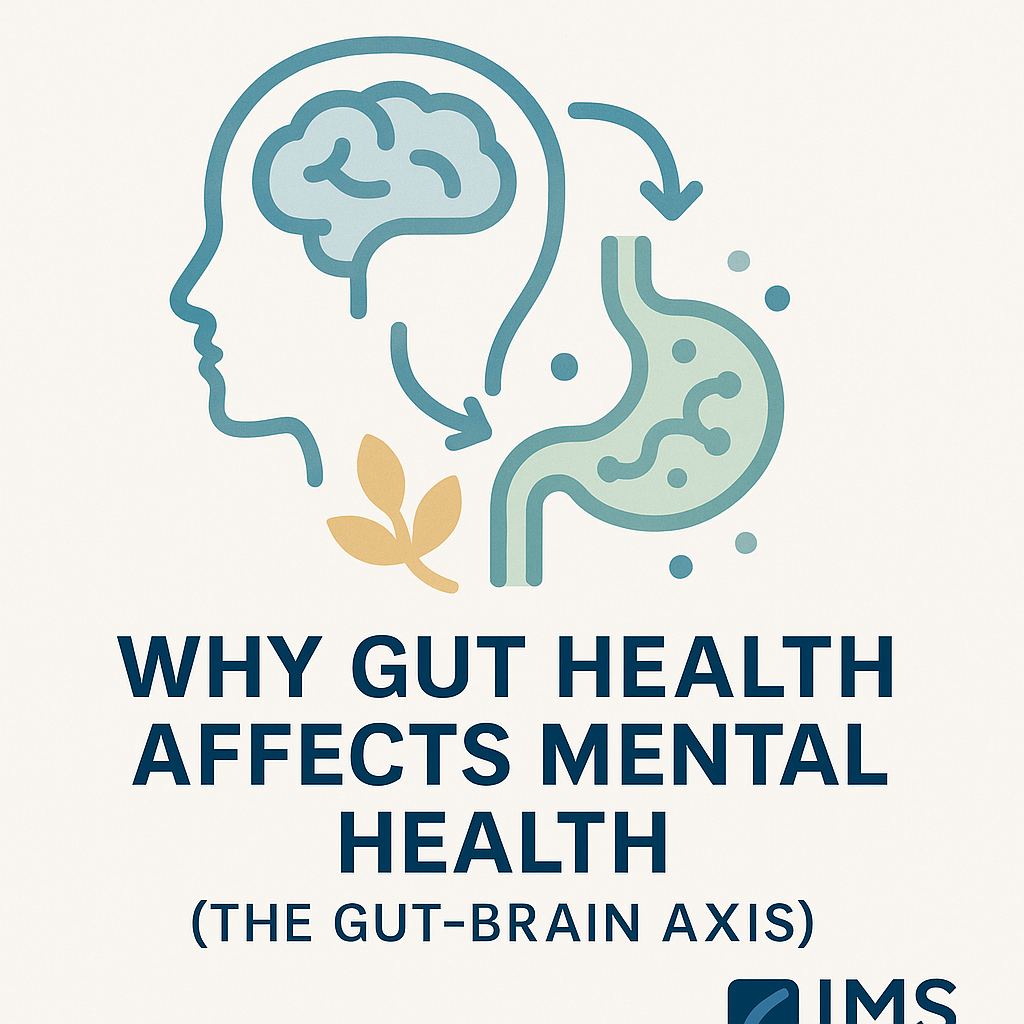
Why Gut Health Affects Mental Health (The Gut-Brain Axis)
Share
Why Gut Health Affects Mental Health (The Gut-Brain Axis)
Learn how gut health affects mental health. Discover the gut-brain axis, microbiome science, and strategies for supporting emotional well-being.
Introduction: More Than Just Digestion
We often think of the gut as only responsible for digesting food. But in recent years, science has uncovered something remarkable: the gut and brain are in constant communication. This connection, known as the gut-brain axis, plays a powerful role in mental health.
From mood regulation to resilience against stress, your gut health may be influencing your emotional well-being more than you realize.
What Is the Gut-Brain Axis?
The gut-brain axis is the two-way communication system between the digestive tract and the brain. It involves:
-
Nerves: The vagus nerve carries signals between gut and brain.
-
Immune system: Inflammation in the gut can affect mood and cognition.
-
Microbiome: Trillions of bacteria in the gut produce chemicals that influence brain function.
In other words, what happens in your gut doesn’t stay in your gut — it can directly impact your mind.
The Role of the Gut Microbiome
The microbiome refers to the community of bacteria, fungi, and microbes in the digestive tract. A balanced microbiome supports:
-
Neurotransmitter production: Gut bacteria produce about 90–95% of the body’s serotonin, a neurotransmitter linked to mood and well-being.
-
Stress response: A healthy microbiome regulates cortisol, the body’s primary stress hormone.
-
Inflammation control: Certain bacteria protect against chronic inflammation, which is associated with depression and anxiety.
When the microbiome is disrupted (e.g., from poor diet, antibiotics, or chronic stress), mental health can also be affected.
How Gut Health Impacts Mental Health
1. Anxiety & Stress
-
Research shows gut bacteria influence how we respond to stress.
-
Dysbiosis (microbial imbalance) can increase sensitivity to anxiety triggers.
2. Depression
-
Studies link gut inflammation and low microbiome diversity to depressive symptoms.
-
Probiotics and dietary changes show promise in reducing depression severity.
3. Cognitive Function
-
The gut produces metabolites that support brain function and memory.
-
Chronic gut inflammation may increase risk of cognitive decline.
4. Trauma & the Body
-
The gut-brain axis is involved in trauma recovery, as early stress can alter microbiome development, shaping lifelong emotional resilience.
Everyday Signs of Gut-Brain Imbalance
-
Frequent bloating or digestive discomfort.
-
Mood swings or unexplained anxiety.
-
Brain fog and difficulty concentrating.
-
Sleep disturbances.
-
Increased sensitivity to stress.
How to Support the Gut-Brain Axis
1. Nutrition for Mental Health
-
Fiber-rich foods (fruits, vegetables, legumes) feed beneficial bacteria.
-
Fermented foods (yogurt, kefir, sauerkraut, kimchi) provide probiotics.
-
Omega-3 fatty acids (fish, walnuts, flax) support brain and gut health.
-
Limit processed foods and excess sugar, which disrupt microbiome balance.
2. Probiotics & Prebiotics
-
Probiotics: Live bacteria that support gut diversity.
-
Prebiotics: Fibers that nourish those bacteria.
-
Both can positively influence mood and stress response.
3. Stress Management
Chronic stress alters gut bacteria. Practices such as mindfulness, yoga, or grounding techniques calm both brain and gut.
4. Sleep
Poor sleep disrupts the microbiome, while healthy gut rhythms improve sleep quality.
5. Movement
Exercise stimulates gut motility, increases microbial diversity, and boosts mood via endorphins.
The Future of Gut-Brain Research
The gut-brain axis is one of psychology and neuroscience’s most exciting frontiers. Emerging studies suggest:
-
Personalized microbiome-based treatments for depression and anxiety.
-
New therapies combining nutrition, probiotics, and psychotherapy.
-
Greater recognition of the mind-body connection in holistic mental health care.
Conclusion: Healing the Gut, Supporting the Mind
Mental health is not only shaped by thoughts and experiences — it’s also influenced by biology, including the gut. By supporting digestive health, we can create stronger foundations for resilience, mood balance, and overall well-being.
If you’d like structured strategies for connecting body and mind, explore our Mind and Body related Workbooks at IMS Psychology.
written by,
Martin Rekowski (27.09.2025)
-
External link suggestion: Harvard Health – The Gut-Brain Connection
- https://www.health.harvard.edu/diseases-and-conditions/the-gut-brain-connection